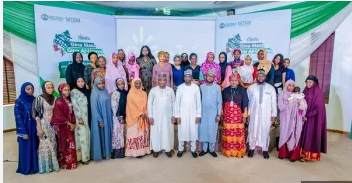The National Information Technology Development Agency (NITDA) is currently prioritising the development of a Gender Digital Inclusion Strategy. This is part of the Agency’s efforts to unleash the full potential of Nigeria’s digital economy and foster greater social and economic development for all Nigerians (DGIS).
Kashifu Inuwa, CCIE, the Director General of NITDA, disclosed the Agency’s focus on gender inclusion at the UN International Women’s Day event hosted by FGN Women Ambassadors Network (FWAN-NET) in Abuja. This year’s commemoration has “Digital: Innovation and Technology for Gender Equality” as its theme.
Inuwa, who was represented by his Special Assistant on Strategy and Innovation Ms. Iklima Musa Salihu, said the goal of the plan is to remove the obstacles that now impede women from fully participating in the IT industry and enjoying the advantages of digital inclusion.
He said that through developing a more inclusive and varied tech industry, NITDA intends to detail concrete initiatives that will be done to close this gap and promote greater gender parity in Nigeria’s digital economy.
He pointed out that the Agency has identified innovation as a key tool for carrying out the National Digital Economy Policy and Strategy (NDEPS), adding that it has the advantageous goal of closing the digital gender gap by ensuring that the digital literacy and skills pillar includes children, women, internally displaced people, and the physically challenged and aligns with the Agency’s mandate of empowering all Nigerian citizens with digital skills.
Read also: IWD 2023: NIPR urges govt to promote gender equality, bridge the digital divide
According to the DG, “In fulfilment of this strategy, we have taken many steps to drive our nation’s prosperity by boosting digital innovation for women, creating an enabling environment that maximises the potential of all Nigerian women, promoting their ability to contribute to the economy, and ensuring their improved quality of life and well-being,” he said.
Inuwa said it was not surprising that Nigeria, as Africa’s most vibrant ecosystem, was making waves both within and outside the continent, attracting 22% (1.2B USD) of Africa’s total investment inflow in 2022. She also noted NITDA’s belief that technology could bridge these gaps as women have unequal access to the same economic opportunities as men.
Inuwa also honoured female talents from Nigeria, including Kemisola Bolarinwa, the founder of Next Wear Technology, a wearable/fashion technology company that designs and develops technology like the Smart Bra for breast cancer detection that uses embedded programmable electronics and sensors on clothing to solve health, security, and communication problems.
NITDA On Digital Innovation Programmes
The Office for Nigerian Digital Innovation (ONDI), he continued, has worked with its foreign-based colleagues to assist 753 female and male-led start-ups through grants, sponsorships of local and international conferences and exhibits, acceleration programmes, and incubation programmes.
The National Digital Economy Policy and Strategy must be implemented with the help of innovation, according to NITDA (NDEPS). The NDEPS, which was introduced in 2019, offers a comprehensive and long-term strategy for the growth of Nigeria’s digital economy, the official said.
In order to guarantee that our young women receive the assistance they need, he continued, NITDA’s profound commitment to encouraging digital innovation among Nigerians is visible in various programmes and projects geared at increasing the inventive ability of our youth and women.
We have observed the conceptualization of creative ideas in an environment that is mainly dominated by males through hackathons and innovation challenges, providing female innovators with equal opportunities. 360 women in diverse geopolitical zones participated in IT and entrepreneurship capacity-building programmes, he added.
Speaking about the Nigeria Startup Act, Inuwa stated that the Nigerian tech ecosystem, the Presidency, and the Ministry of Communications and Digital Economy came up with the idea of the Nigeria Startup Bill, which was approved by President Muhammadu Buhari and will be used as a tool for maximising the potential of the digital economy by creating an environment that can support the expansion and innovation of local startups.
According to Inuwa, the rule would enable Nigeria to benefit from the African Digital Economy, which McKinsey estimates will be worth $300 billion by 2025.
Inuwa highlighted his great worry that there is still a startling lack of female representation despite the impressive advancements made in the digital sphere.
Despite their evident aptitude and capacity to make important contributions to the area, he regretted the reality that women are still disproportionately underrepresented in digital environments.
In order for everyone, regardless of gender, to succeed and prosper in the digital age, he said there must be persistent efforts to promote gender equality and inclusion.




